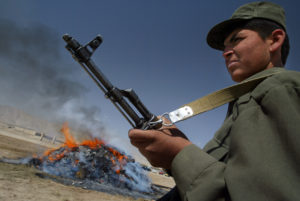Opium remains the country's most valuable cash crop (Photo by David Bathgate/Corbis via Getty Images)
In his 2015 documentary Bitter Lake, the filmmaker Adam Curtis observes that Afghanistan’s opium poppies grow in a “wonderland of vegetation and power”. Amid the conspiratorial hyperbole that characterises much of his work, it is a striking phrase — but also a perceptive one. The poppy is integral to modern Afghanistan because of its relationship to both vegetation (and the communities it sustains) and the exercise of raw power: two of the main forces which drive Afghan politics.
Understand this imperishable fact and it becomes clear how the country fell so quickly to the Taliban over recent weeks.
The Afghan poppy has been an economic and political force for almost 150 years. As James Tharin Bradford explains in Poppies, Politics, and Power, its modern state was built in the late 1800s “in the shadow of poppy production”. But the emergence of the international drug control regime in the early 20th century saw opium production banned. Afghanistan could no longer legally sell drugs, and as a result it lost a major source of state income as well as control over many of its rural areas, which relied on opium to survive and just carried on producing it regardless of the prohibition that Kabul was now obliged to enforce. For the first time the poppy came between the peripheries and central authority.
But then in 1979, the Soviets invaded — and opium production spiralled. The mujahedin that resisted Moscow needed cash to fight, and their make-up and available options meant they relied on two things: the rural economy and the global drug trade. Drug production may have remained illegal until 1992, but that didn’t stop Afghanistan becoming one of the most valuable opium suppliers in the world during the 1990s.
Indeed, by 1999 the country produced 79% of the world’s illicit opium. Even when, a year later, the Taliban banned its production, it still accounted for 70%. Today, it remains the country’s most valuable cash crop worth $863 million, and the “industry” is the largest national employer with more than 500,000 people in the equivalent of full-time work.
Now that the Taliban are back, there are fears that Afghanistan’s drug production — which now also includes marijuana and increasingly methamphetamine — will explode. People are worried. “Taliban mulls flooding the West with heroin to shore up Afghan economy,” according to The Telegraph. What next?

It is important to understand what the Taliban is not: it is not a drug cartel and Afghanistan was never the narco-insurgency or state of popular imagination. The group’s views on opium are almost as variegated as the Talibs themselves. Some will tell you that Opium is haram, forbidden. The Taliban banned its production in 2000 on the grounds that it was not Islamic (though political motives were probably more important). But Islam can be flexible, if necessary. Even its most ardent commandants have a surprising amount of wiggle room; for example, if you’re starving, you can even permissibly consume the “donkey you cannot eat” (the pig).








Join the discussion
Join like minded readers that support our journalism by becoming a paid subscriber
To join the discussion in the comments, become a paid subscriber.
Join like minded readers that support our journalism, read unlimited articles and enjoy other subscriber-only benefits.
SubscribeExcellent column. Tks.
Great article. Starting in the 1950’s, USA funded and provided much technical support to the Helmand and Arghandab Valley Authority (HAVA) which, through irrigation, increased agricultural output in southeastern Afghanistan … until the Soviet invasion when much of this new agricultural
land was turned over to poppy. The best laid plans o’ mice and men gang aft agley!
How I remember the Qanats (pronounced ganats) or Karez of Iran and Afghanistan – and the jubes flowing the clear water in arid places….I was always fascinated by the hidden world under ground where the crystal cool water flowed through the baking hot, arid land of thorny scrub and lizards…
Look at Mexico, and how that progresses under the eye of America.
Give me the Taliban with their very ridged moral code of Islam (harsh as it seems to us, but still based on the 10 commandments) Rather than the Central and South American Drug cartels with their Santa Muerte death cult based morality.
Apart from the clinical use of diamorphine – heroin to you and me – for palliative care of people who are beyond treatment – there’s another word for this that dare not speak its name – it’s ‘recreational’ users whom we can ultimately thank for the misery of Afghanistan. Do they care? I doubt it.
Having lost my three best mates, from school age to heroin, I can tell you that no, they don’t care. All they care about is where the next hit is coming from. These were all middle class lads, and one even went to Sandhurst FFS!
Fentanyl is crashing the value of the heroin, thanks to our great whole sale shopping suppliers, China. What they did to the cost of computers and plastic toys they will do to Opium.
Till this article I had never even thought of Meth being made in Afghanistan – I imagine it would be against Talib ethics….. but then, if the profit is still high enough…. but it is hard to imagine the rest of the lawlessness world cannot keep up with supply demand.
Sherlock Holmes took opium. I can’t really see the problem with taking opium or heroin. It’s better than alcohol, or nicotine, or certainly no worse. Legalisation of opium would solve many problems without creating too many more. It would marginalise the big drugs cartels because Philip Morris, RJ Reynolds, Seagrams and BAT would take over. If people want to get high, why not let them? If people want to get drunk, why not let them ?
Sherlock Holmes wasn’t real.
The thousands of people overdosing on drugs across the US are.
He took cocaine, I think. Arthur Conan Doyle seems to have despised opium addicts, judging by the stories where it is mentioned.
Opium causes intractable constipation.